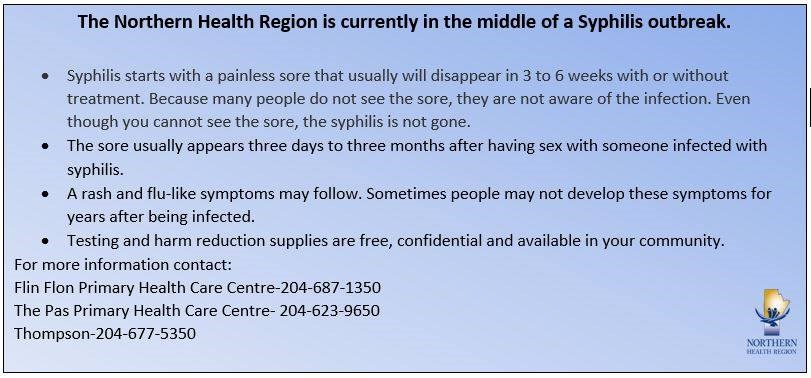A rise in the number of syphilis cases in Northern Manitoba that began about four years ago has not yet levelled off, says Manitoba’s acting provincial public health officer Dr. Michael Isaac.
In 2019 so far, the province’s north has seen 100 confirmed cases of the blood-borne disease, putting the region on pace to top last year’s 176 cases, though Isaac says both those numbers could change as a result of ongoing investigations. In 2017, there were 109 cases, 99 in 2016 and 56 in 2015, a sharp increase from only 10 confirmed cases in 2014.
“The trend is pretty clear that we’re still on the rise,” Isaac said. “Syphilis rates continue to climb in the region.”
Syphilis can be transmitted sexually as well as through the sharing of needles for intravenous drug use. Symptoms can include sores on the genitals or on a person’s mouth or anus but they are typically painless and people may not notice them.
“Some people will not know if they have symptoms,” Isaac said.
These sores can also make it easier to transmit or contract other sexually transmitted infections like HIV, gonorrhea, and hepatitis B and C.
“It can act as an open doorway for the HIV virus,” Isaac says, noting that hepatitis C cases are up around the province, though there has not been an increase in HIV numbers in Northern Manitoba as of yet. Hepatitis is most commonly spread through the sharing of IV drug injection equipment.
Though syphilis is easily cured with a dose of long-acting penicillin, it can have serious health impacts.
“Untreated syphilis can spread through the body and, if it is left untreated, a certain proportion of people will get complications even years down the road,” Isaac says. “It can be pretty severe if it’s left untreated. We’re lucky with syphilis that we haven’t seen [antibiotic] resistance.”
Part of the reason more cases are being confirmed in recent years – including four confirmed cases and one suspected case of congenital syphilis passed on to newborns by their mothers in Manitoba from 2015 through 2018 – is because the Northern Regional Health Authority is doing more testing and has implemented additional testing for pregnant women – two tests during pregnancy instead of the standard single test and a third test just after giving birth.
“We’re definitely doing more testing for syphilis than we have in the past,” Isaac says.
Syphilis tests are widely available in the north, with some public health nurses having been trained to take samples. In Thompson, it is available at the clinic in the plaza, the teen clinic and also through public health nursing staff.
“We need to know that someone has it,” in order to be able to treat it and limit the disease’s spread, Isaac says. “If you don’t know you have [sexually transmitted infections] we can’t get to the point of treating them so it’s important to get tested.”
The NRHA is also supporting harm reduction efforts like clean needle distribution through the Safer Choices Northern Network in the Thompson area and the Play It Safer network in The Pas and Flin Flon, since increased IV use of crystal methamphetamine and sharing needles is contributing to syphilis’s spread.
“Across the province we’re seeing an increase in crystal methamphetamine use,” said Isaac, including in northern communities.
New needles are also available through Thompson public health and people who are using IV drugs should not share injection equipment and get tested for syphilis, HIV, hepatitis and other blood-borne infections every three months. Frequent testing is also recommended for sex workers and those who have sex with multiple partners, who can reduce their risk of getting syphilis by practising safe sex.
“Using condoms is a way to reduce the risk of acquiring syphilis,” said Isaac.
The province is also looking at different ways of testing rather than the current method of drawing blood and taking a urine sample. Dried blood spot testing, in which a person dabs a sample of their blood onto a card and sends it in to get tested is one alternative method that may become more common in the future.
“It’s not currently widely available in Canada,” Isaac says.




